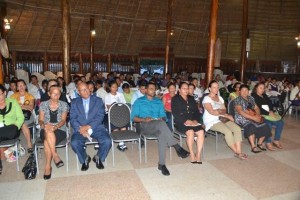
The Amerindian Affairs Ministry on Tuesday evening hosted a reflection and exhibition, in honour of the life and contributions of prominent Amerindians and the first indigenous parliamentarian Stephen Campbell.
The ceremony, which was held at the Umana Yana, Kingston, is part of the Amerindian Heritage Month activities being held under the theme “Honouring Our Culture, Advancing Our Future”.
During this tribute, Amerindian Affairs Minister Pauline Sukhai lauded the contributions of Campbell along with former ministers of Amerindian affairs Desrey Fox and Vibert De Souza, along with indigenous advocate Basil Rodrigues.
She urged Guyanese to be acquainted with the level of contributions of these prominent Amerindians and that “we should not only preserve the culture, but respect and recognise the Amerindians’ contributions to the country’s development”.
“The Ministry of Amerindian Affairs of course will continue to enhance the scholarship programme, and that is why we expect the highest of potential by the students who we assist,” the minister pointed out.
She said that since more opportunities in the education sector are now being provided to indigenous people, they should take advantage of them.
The evening’s activity also included poems, dramatic presentations and indigenous songs paying tribute to the Amerindian advocates.
Amerindians today are represented in all areas of academic disciplines and civil society. New secondary schools were built in all hinterland regions and an increasing number of hinterland children have access to higher education. Amerindians are today more empowered through the opportunities afforded to them.
Stephen Esterban Campbell was born in Moruca on December 26, 1897 to Tiburitio and Maria Campbell. Both of Stephen’s parents died when he was very young and was subsequently raised by his grandmother whom he credited with teaching him the core principles of life; “religion and discipline”.
He attended Santa Rosa Primary School. In 1919, Campbell dedicated his time to teaching basic instructions of literacy to the Wapishianas of the Rupununi.
He was also the founder of the first school in the village of Sawariwau. In 1953, while in the North West District, he worked as an electoral official for the elections where he served as a presiding officer.
In 1957, Campbell had formally been inducted in the national political life. He joined the National Labour Front (NLF), one of five political parties that competed in the general elections in that year. He rose to the occasion and defeated his other rivals for the North West District seat and in the process, he was the only man to gain a seat won by the NLF.
He was sworn in on September 10, 1957 and at his initial stage of being a legislator, Campbell repeatedly highlighted the need for improved transportation in the remote interior and expansion of agricultural production. He was also pivotal to the development of improved health facilities in Region One.
He died on May 14, 1966.



